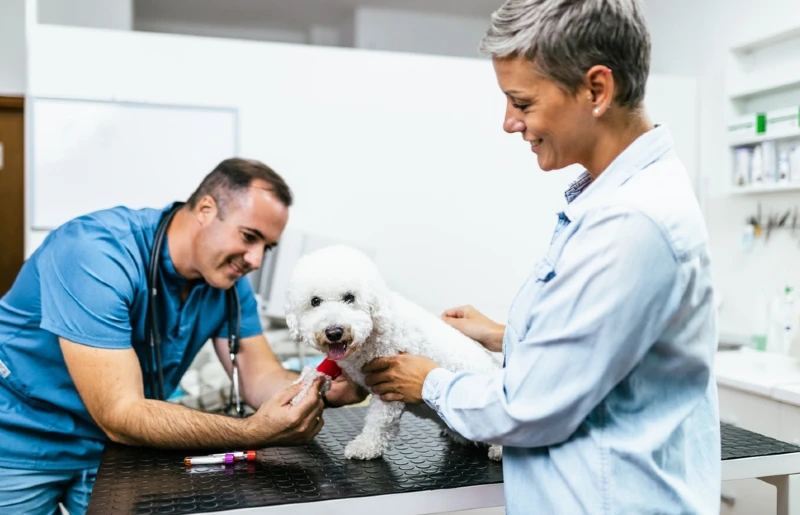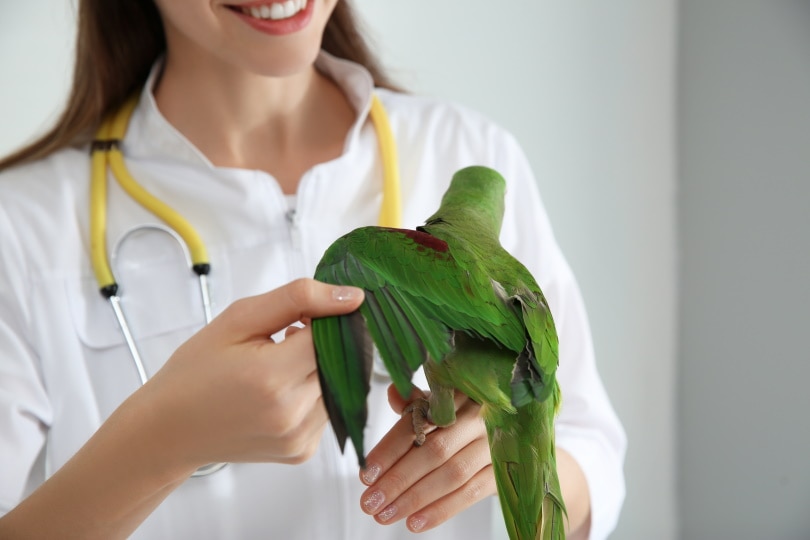Click to Skip Ahead
There’s no denying that veterinary care costs have risen over the years. In 2010, pet owners spent about $13 billion 1 on veterinary care, while in 2020, spending went up to $38.3 billion 2.
Vet visits have become more expensive due to factors such as inflation and increased demand. The services within the pet industry also continue to change as many current pet owners view their pets as family members and expect higher-quality care.
Compared to the past, pet care is looking pretty different these days, and it is important to keep up with trends so that you know what to expect if you currently live with a pet or are thinking of bringing home a new pet. Here are the updated costs of vet visits and what you can expect to pay.
As a general overview, basic annual vet visits for cats and dogs are between $50 to $250, and they can go up to $8,000 for specialized treatment (wound treatment, bloat treatment, emergency surgery, etc.). And for an exotic pet, you can expect to pay anywhere between $100 to $250 for a routine visit.
The Importance of Vet Visits
Staying up to date with routine veterinary visits is one of the best things you can do for your pets. It’s very helpful to have professionals involved in your pet’s life because they can help your pet stay on top of vaccinations and screen for any diseases or conditions that your pet is prone to developing. They can also provide invaluable information that’ll help you be a better pet owner.
Since pets can’t verbally express their physical condition, vets can step in by using their expertise to look for any potential warning signs. They can help you decipher what your pet is trying to communicate.
Cats and dogs require annual vet visits for health checkups and updated rabies vaccines. However, it does not hurt to bring in small mammals and reptiles to your vet for routine checkups as well. Vets can check your pets for any parasites or abnormal developments.
How Much Does a Vet Visit Cost?
The cost of a vet visit will vary based on several different factors. One of the most significant factors is the services involved with the visit. Routine checkups with minimal testing will be the cheapest. If your pet needs vaccines or bloodwork done, you can expect prices to go higher. Screenings and the use of equipment, such as X-rays and CT scans, will also increase costs.
Your pet’s age will also affect costs. Younger kittens and puppies may have more expensive visits because they require more attention and need to complete their core vaccines. Older pets also tend to have more expensive vet visits because they may need to be screened for any age-related illnesses.
Lastly, geographic location may also contribute to the cost of vet visits.
So, with all these considerations in mind, you can expect basic annual vet visits to be between $35 to $80 for cats and dogs. If your visit consists of more specialized care, such as dental cleaning or cancer screening, you can expect prices to go up to about $300 to $500.
Despite their smaller size, exotic pets tend to have more expensive vet visits because they require more specialized care. The cost of routine exams will vary depending on the species of your exotic pet, but you can expect to pay anywhere between $100 to $250.
Some pets, such as fish, are less mobile and require home visits. These visits can cost several hundreds of dollars and will often heavily depend on the miles traveled by the vet.
Here’s a further breakdown of costs for various types of pets.
Average Vet Visit Costs per Species
The following charts go over the average vet visit costs per species. Where you live in the USA will affect these costs. Even the cities within the same state will affect the overall cost. Unfortunately, there is no standard vet cost that is universal across the USA. However, these charts can give you an idea of the average.

1. Dogs
| Procedure | East Coast | Midwest | West Coast |
| Routine Visit | $70 | $64 | $72 |
| Vaccines | $23–$53 | $22–$50 | $24–$53 |
| Dental Cleaning | $402 | $374 | $409 |
| Neutering/Spaying | $425–$600 | $404–$570 | $430–$605 |
2. Cats
| Procedure | East Coast | Midwest | West Coast |
| Routine Visit | $70 | $64 | $72 |
| Vaccines | $27–$35 | $26–$33 | $28–$36 |
| Dental Cleaning | $402 | $374 | $409 |
| Neutering/Spaying | $219–$370 | $209–$353 | $222–$375 |
3. Rabbits
| Procedure | East Coast | Midwest | West Coast |
| Routine Visit | $55 | $50 | $70 |
| Neutering/Spaying | $220–$325 | $200–$300 | $200–$350 |
4. Ferrets
| Procedure | East Coast | Midwest | West Coast |
| Routine Visit | $65 | $50 | $65 |
| Vaccines | $15–$20 | $15–$20 | $15–$20 |
5. Small Reptiles
| Procedure | East Coast | Midwest | West Coast |
| Routine Visit | $110 | $75 | $85 |
| Fecal Exam | $80 | $65 | $70 |
6. Fish
| Procedure | East Coast | Midwest | West Coast |
| Routine Visit (in office) | $100 | $100 | $125 |
Additional Costs to Anticipate
During routine visits, your vet may discover or suspect something that requires further examination. You may also end up having to pay for medication related to diseases or infections. Here are some additional costs you may face with different types of pets.

Cats and Dogs
Cats and dogs can end up needing further examination for a variety of reasons. Here are some common additional costs you can expect from a vet visit:
- Flea and tick control: $40–$200
- Allergy test: $80–$300
- Heartworm test: $45–$50
- Non-complex skin mass sample: $180–$375
- Ear infection: $40–$150
- Feline leukemia virus testing (cats only): $60–$120
Small Mammals and Reptiles
Small mammals and reptiles tend to be low-budget pets, but they can sometimes require additional veterinary care. The following are common procedures your small mammal may need:
- Spaying/Neutering: $250–$350
- Ferret vaccines: $15–$20
- Fecal exam: $15–$30
- Blood test: $80–$200
Fish
It’s also recommended for pet fish to go to the vet. Costs will vary since pet fish are diverse in size and needs. However, exotic vets will usually accept appointments for common pet fish including goldfish, bettas, and koi.
- At-home visit: $200–$300
- Ultrasound: $300
How Often Should I Take My Pet for a Vet Visit?
The frequency of vet visits will depend on the type of pet, the age, and if your pet has any chronic illnesses. Puppies, kittens, and some small mammals, such as young ferrets, require more frequent vet visits to get their vaccines and track their development.
Healthy adult pets usually only need about one vet visit a year. If you have an adult pet with chronic conditions, make sure to communicate with your vet to see how many times you should come in for follow-up appointments throughout the year.
Geriatric pets will also most likely require more frequent vet visits. As pets get older, they are more prone to developing health conditions and illnesses, such as an overactive thyroid, digestive issues, diabetes, and renal disease. It’s important to regularly monitor these conditions to make sure that your pet has the best quality of life possible.

Does Pet Insurance Cover Vet Visits?
Fortunately, pet insurance companies cover basic vet visits as long as you’re up to date with paying premiums and deductibles. You can also select more advanced or customized pet insurance plans that offer coverage for more services, such as x-rays, prescription medication, and care for chronic conditions.
If you have a relatively healthy pet, you can also enroll in wellness plans. For example, Banfield has its own wellness plan program. It’s not pet insurance and acts more like a membership program. By paying an annual fee, you can receive discounted prices for using Banfield products and services.
So, it doesn’t hurt to check if your veterinary clinic offers some sort of membership program to help reduce veterinary costs. It may be a more affordable route if you have a healthy pet and don’t want to get stuck paying premiums for a plan you don’t end up using.
What to Do for Your Pets in Between Vet Visits
Make sure that you receive answers to all the questions you have regarding your pet’s health. Then, be consistent with caring for your pet according to your vet’s instructions. Stay on top of giving your pets routine medication, such as heartworm pills and flea and tick medication. Be vigilant until your next vet visit.
One of the best things you can do is make sure that your pet is staying healthy and active. Pet obesity is an epidemic in the United States. Your pets won’t know the exact nutritional value of the food that you give them and won’t know how to control the amount of food they eat. So, it’s completely the owner’s responsibility to make sure that their pets are eating a healthy diet with appropriate portions and staying away from unhealthy human snacks and junk food.
Pets also rely on their owners to receive ample amounts of exercise. Make sure that your pets all have plenty of enrichment toys to keep them mentally stimulated and have opportunities to roam around and explore. Small pets can benefit from having a playpen where they can step out of their cages and run around.

In Conclusion
The cost of vet visits will vary based on the type of pet, your pet’s age, and if they’re living with any chronic conditions. Vet visits may seem like unnecessary annual costs at times, but they can actually end up saving you money in the long run. Keeping up with routine vet visits can help screen for illnesses and issues at early stages and help you avoid paying for expensive surgeries.
You can also look into purchasing a pet insurance plan that includes coverage for vet visits. Pet insurance plans can be especially helpful for older pets with more health care needs.
Overall, vet visits are essential for the lifetime of your pet. With the continuous rise of pet ownership and the growth of the pet industry, we’ll most likely see veterinary care change with the demands. It will be interesting to see how costs are affected, and we’ll be sure to keep you in the loop with the latest updates as they arise.
Featured Image Credit: Veronica Louro, Shutterstock













